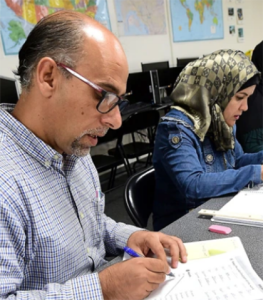Refugee professionals struggle to re-establish careers in US – study
Professionally qualified refugees in the US find it harder to get work the longer they have lived in the country, a new study has found.
The employment trend research by Cornell University found that despite receiving lawful permanent resident status, after living in the US for five years, refugees’ employment declines.
 The researchers say the US’ rapid, self-sufficiency approach to refugee settlement may be to blame with not enough resources allocated to ensure long-term employment success.
The researchers say the US’ rapid, self-sufficiency approach to refugee settlement may be to blame with not enough resources allocated to ensure long-term employment success.
The researchers found that after living in the US for five years, refugees’ employment declines, despite gaining lawful permanent residency status, known as a green card.
They said that US government supports are designed to last about six months after refugees arrive in the US, with support vanishing after that point.
Within those six months, refugees are expected to achieve self-sufficiency as quickly as possible, which includes settling into a foreign community, establishing English language skills and finding a job.
The research analysed the number of refugees who received permanent resident status in 2003 and found they had a higher propensity to be employed compared to non-refugees.
But by 2007-2009, the same refugees experienced a decline in their likelihood of employment, their employment advantage turning into a disadvantage.
The researchers say the decline is driven by a variety of factors, starting with how the US government has increasingly relied on not for profit and private institutions to help with resettlement programs, but it rarely coordinates efforts with them.
They say money is also an issue, with refugee resettlement funding declining over time and also becoming less reliable.
Funding fluctuates from year to year depending on the anticipated refugee flow and the political priority given to refugee matters, the researchers say.
They says the situation became worse during administration of President Trump because of its anti-immigrant stance.
Most not for profit organisations receive government funding that depends on the number of refugee job placements they make, which leads many refugees stuck in what are termed ‘survival jobs’.
The researchers describe these as low wage positions that offer little to no career growth, and that often only need low-skills and consist of manual labour.
There are about 2.2 million university educated immigrants and refugees living in the US who are unemployed and under employed, according to Upwardly Global, a not for profit that helps immigrants and refugees rebuild their careers in the US.
Meanwhile the US is suffering a dire labour shortage, with shortages of nurses and logistical workers in many states.
“The reality is that I think it’s really hard for people to realize we’ve got a lot of this talent already in the United States and we’re just not tapping into that talent, because it doesn’t present itself in a way that we’re used to,” said Upwardly Global CEO Jina Krause-Wilmar.
The Cornell researchers call this phenomena ‘brain waste’ and estimate it costs the US about $US10 billion a year in tax revenue.
The researchers found a similar trend, with some federally funded resettlement agencies saying they had to counsel refugees into taking minimum wage and low wage jobs, ultimately resulting in refugee employment as, “a cardinal waste of human capital”.
“A classic example, they may have been a doctor in their home country, but they obviously can’t practice right away. Obviously getting the credential is extremely expensive and so they may end up working as an orderly or an aid in health care,” the report said.
In many cases, refugees ultimately do work that’s completely different than their qualifications merit, the researchers said.
They said one solution would be to have government programs that focus on licensing and credentialing, so refugees have an opportunity to apply their skillset for the American job market.
“Looking at how we streamline and reduce red tape and licensing for some of these more regulated professions, not at all impacting the integrity of the profession, but there’s an incredible amount of red tape,” they said












